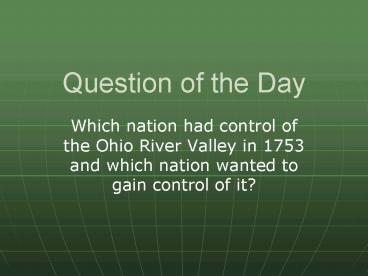Question of the Day - PowerPoint PPT Presentation
1 / 18
Title:
Question of the Day
Description:
Question of the Day. Which nation had control of the Ohio River Valley in 1753 ... Benjamin Franklin, a delegate from Pennsylvania at the Albany Congress, ... – PowerPoint PPT presentation
Number of Views:18
Avg rating:3.0/5.0
Title: Question of the Day
1
Question of the Day
- Which nation had control of the Ohio River Valley
in 1753 and which nation wanted to gain control
of it?
2
Chapter 10, Section 2A Contest For The Empire
- ? George Washington ? French and Indian War
- ? Benjamin Franklin ? Albany Congress ? Treaty of
Paris
- Main Idea
- Britains victory in the French and Indian War
forced the French to give up their holdings in
North America. - Why It Matters Now
- Although France lost its claims, French
influence in North America can still be seen.
3
Setting The Stage
- On October 31, 1753, George Washington was sent
with a letter from Governor Dinwiddie of Virginia
demanding that the French depart from the Ohio
River Valley.
- The French commander scoffed at the letter.
- The British now had to decide between losing the
Ohio River Valley or fighting the French for it.
4
Beginnings Of The French Indian War
- About 4 months after his meeting with the French
commander, Washington was ordered to build a fort
at the beginning of the Ohio River.
- Washington soon learned that the French had
already built Fort Duquesne on the same spot. - Washington quickly built Fort Necessity on
another site.
5
Beginnings Of The French Indian War
- Washington attacked the French on the evening of
May 27, 1754, killing 15 and capturing 22 French
soldiers. - Washingtons victory was short-lived.
- On July 3, the French surrounded Washington at
Fort Necessity. After a day of hard fighting,
Washington surrendered.
6
Beginnings Of The French Indian War
- The French sent Washington back to Virginia with
a message Stay out of French territory! - British author Horace Walpole remarked, The
volley fired by this young Virginian in the
forests of America has set the world in flames. - It was the beginning of the French Indian War,
1754 1763.
7
An Alliance With The Iroquois
- While Washington was defending Fort Necessity, a
meeting was held in June 1754 to discuss an
alliance with the Iroquois which became known as
the Albany Congress. - Rather than offer support to the English, the
Iroquois challenged Englands strength in the
region. - The Iroquois accepted many gifts, but they made
few promises in return.
8
Unity Rejected
- Benjamin Franklin, a delegate from Pennsylvania
at the Albany Congress, presented a plan to form
a union among the colonies. - Franklins plan proposed a Grand council made up
of representatives from each colony and a
president general appointed by the King.
9
Unity Rejected
- North Carolinas Assembly ordered the plan
printed for later study. - Only Massachusetts seriously debated the plan.
- Franklin complained, Everyone cries, a union is
necessary, but when they come to the manner and
form of a union, their weak (heads) are perfectly
distracted.
10
North Carolina To The Rescue
- In 1754, the North Carolina Assembly agreed to
send troops to Virginia and to levy a special tax
for defense of the frontier. - North Carolina sent Colonel James Innes with 450
North Carolina Militia.
11
A North Carolina Victory
- At the start of the war, some Native Americans
allied with the British, but most sided with
their French trading partners. - The French were encouraging the Cherokee Indians
to attack British settlements. - North Carolina built Fort Dobbs near Statesville.
12
A North Carolina Victory
- In the winter of 1758, North Carolina sent 300
troops under the command of Major Hugh Waddell. - Waddell and Sergeant John Rogers disguised
themselves as Indians and seized a Native
American that had just been inside Fort Duquesne.
- With the information Waddell and Rogers gained,
the British were able to take Fort Duquesne
without firing a shot.
13
The British Victory At Quebec
- William Pitt, the British secretary of state,
took over leadership of the war effort in 1757
and turned the tide of the war in Britains
favor. - In 1759, General James Wolfe captured Quebec
which gave England control over part of what is
now Canada.
14
Peace Treaties Of 1763
- Although local skirmishes continued along the
frontier into 1763, the victory at Quebec had
decided the wars outcome in Britains favor. - In November 1763, Governor Dobbs attended a peace
conference in Augusta, Georgia. - Along with 25 Native American chiefs, 4 colonial
governors, and a British official, Governor Dobbs
helped to negotiate the terms of a peace treaty.
15
Peace Treaties Of 1763
- Also in 1763, the British signed the Treaty of
Paris, officially ending their war with France
and gaining what is now Canada and most of the
French holdings east of the Mississippi River. - English colonists suddenly found themselves part
of one the worlds greatest empires.
16
British North America In 1763
17
Do you remember?
- Which nation had control of the Ohio River Valley
and which nation wanted to gain control of it? - Answer Both France and England claimed the
region, but France had control and Britain wanted
it. - Describe Washingtons first encounter with the
French in 1754 at Fort Necessity. - Answer His first encounter ended in defeat when
the French surrounded him and he subsequently
surrendered the fort.
18
Do you remember?
- Describe the Albany Congress?
- Answer The meeting was called to negotiate an
alliance with the Iroquois. - What plans did Benjamin Franklin propose at the
Congress? - Answer He proposed a union among the colonies.
- How did the colonists respond to Franklins plan?
- Answer Only Massachusetts seriously debated the
plan.































